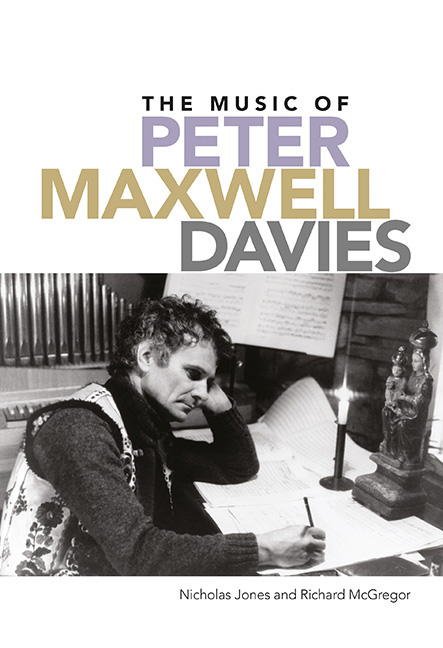Book contents
- Frontmatter
- Dedication
- Contents
- List of Illustrations
- Acknowledgements
- Prelude
- 1 Biography, Stylistic Development, Autobiography
- 2 Compositional Technique and Process
- 3 Genre
- 4 Form and Architecture
- 5 Tonality and Texture
- 6 Allusion, Quotation, Musical Critique
- 7 Landscape and Place
- Postlude
- Catalogue of Works
- Select Bibliography
- Index of Works by Peter Maxwell Davies
- General Index
3 - Genre
Published online by Cambridge University Press: 27 March 2020
- Frontmatter
- Dedication
- Contents
- List of Illustrations
- Acknowledgements
- Prelude
- 1 Biography, Stylistic Development, Autobiography
- 2 Compositional Technique and Process
- 3 Genre
- 4 Form and Architecture
- 5 Tonality and Texture
- 6 Allusion, Quotation, Musical Critique
- 7 Landscape and Place
- Postlude
- Catalogue of Works
- Select Bibliography
- Index of Works by Peter Maxwell Davies
- General Index
Summary
John Warnaby asserted that ‘no contemporary composer has demonstrated a deeper understanding of music history than Peter Maxwell Davies’, and, he might have added, this was achieved through his engagement, at multiple levels, with musical genres that carry profound historical resonance and pedigree: indeed, Davies's compositions covered most of the established genres. While discussion in this chapter focuses on, in particular, Davies's cyclic or developmental treatment of major instrumental genres such as the symphony, concerto, and work for various ensembles (string quartets, various chamber groups – Pierrot Players, The Fires of London and beyond) – it also considers Davies's characteristic treatment of the dramatic (opera, music-theatre), the choral (mass, cantata, anthem, carol) and, not least, the many works in his output for younger players.
WORKS FOR YOUNGER PERFORMERS
It might seem perverse to begin with Davies's works for children but this was no add-on to his output for professionals: rather, it was every bit as essential a part of his musical personality as anything he composed for the various groups and orchestras with which he was associated. There are more than thirty substantial works for young people of all ability levels, including accompanying parts designed for inexperienced players, professionals or both.
Throughout his career Davies was committed to providing significant music for young performers, from the earliest version of Five Klee Pictures (1959, rev. 1976) to The Hogboon (2015), written in the year before he died. During his time as a music teacher at Cirencester Grammar School he made various arrangements of music from the fifteenth to seventeenth centuries for voices or for orchestra at a time when such music was still relatively unknown. Simultaneously he was writing O Magnum Mysterium for voices and school orchestra (1960), which in performance was followed by an organ fantasia. At Cirencester he encouraged the children to compose but believed from the outset that they had to be familiar with the basis of tonal harmony before developing their own work. Following in the footsteps of Carl Orff and Paul Hindemith, he was among the first educators, let alone composers, who believed that children should be actively involved in music making rather than, as was very common at the time, to simply be given songs to sing or played music to ‘appreciate’.
- Type
- Chapter
- Information
- The Music of Peter Maxwell Davies , pp. 103 - 141Publisher: Boydell & BrewerPrint publication year: 2020



